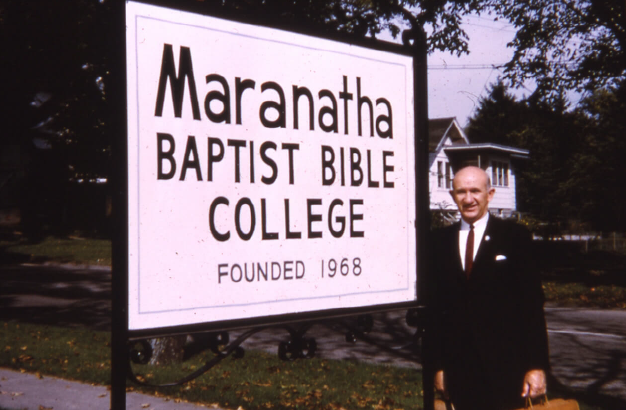Offered On-Campus
Offered Online
Maranatha Today
Maranatha Baptist University was established in 1968 in Watertown, Wisconsin, as an institution to be “To the Praise of His Glory.” This motto, taken from the Bible (Ephesians 1:12), reflects Maranatha’s deeply held religious conviction that the primary purpose of every Christian is to glorify God through one’s chosen occupation and church membership, and by serving others in God-honoring ways.
The founder, Dr. B. Myron Cedarholm, envisioned a Christian college encompassing the broad inclusion of liberal and fine arts education. Originally founded as Maranatha Baptist Bible College signifying the centrality of biblical studies and local church engagement in its purpose, the name was changed to Maranatha Baptist University in 2014 to reflect more accurately to constituents the broad range of academic and career preparation programs offered while maintaining its founding purpose.

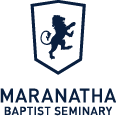


Maranatha maintains a strong set of spiritual and behavioral distinctives generally reflected in constituent churches.
Faculty members share a common core of biblical values and consider themselves conservative, independent Baptists.
Maranatha represents a community of faith that is deeply committed to its shared biblical values.
Maranatha attained institutional accreditation by the Higher Learning Commission in February 1993.
Maranatha’s rigorous academics have prepared more than 6,000 leaders to take the mission of Maranatha across the globe.

Mission
Maranatha Baptist University exists to develop leaders for ministry in the local church
and the world “To the Praise of
His Glory.”
The mission of Maranatha comes directly from Ephesians 1:12, “That we should be to the praise of his glory, who first trusted in Christ.” Maranatha’s institutional mission and values are sourced in its faith-based, biblical values. The institution’s core identity as a conservative, Baptist institution of higher education has been well-maintained through its five decades of operation.

The Executive Office oversees the implementation of Maranatha’s strategic planning process, which advances the mission while maintaining a focus on student learning. The President and Chief Executive Officer ensure that every institutional action reflects a commitment to the mission and core values through established expectations and systems for accountability at every level. Maranatha’s executive leaders, board members, and leadership teams champion its commitment to fidelity, innovation, and continuous quality improvement.
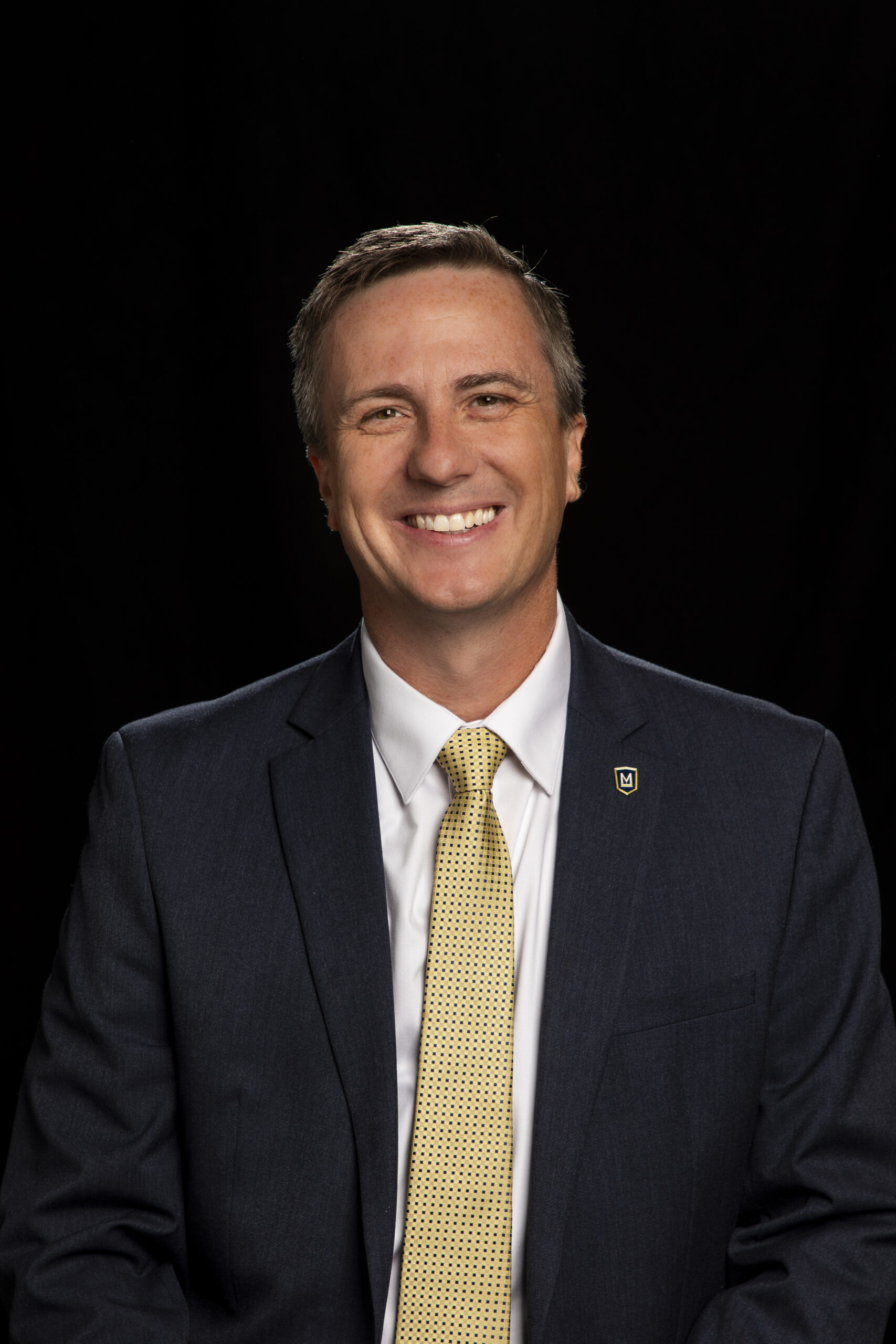
Dr. Matt Davis
Chief Executive Officer
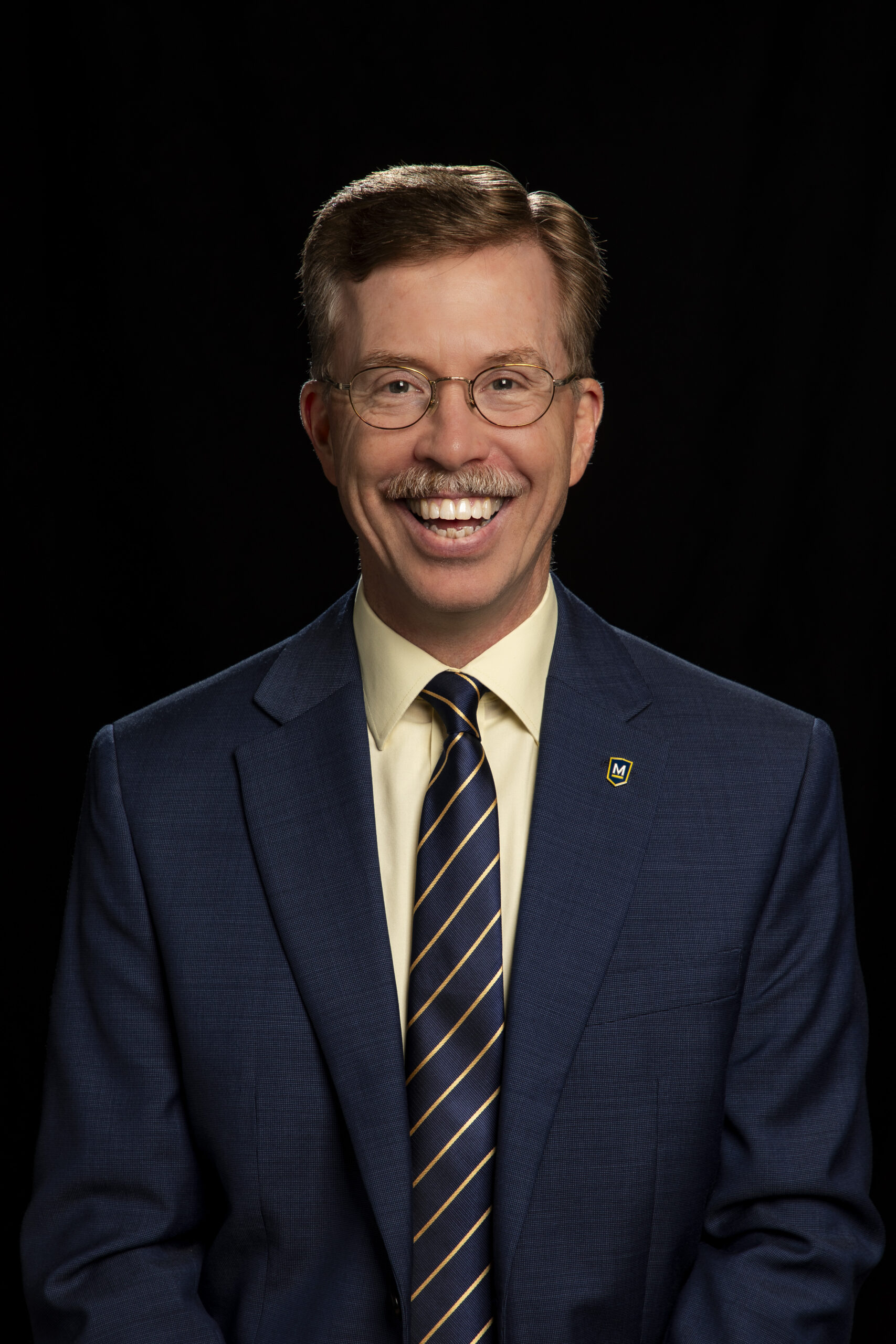
Dr. David Anderson
President
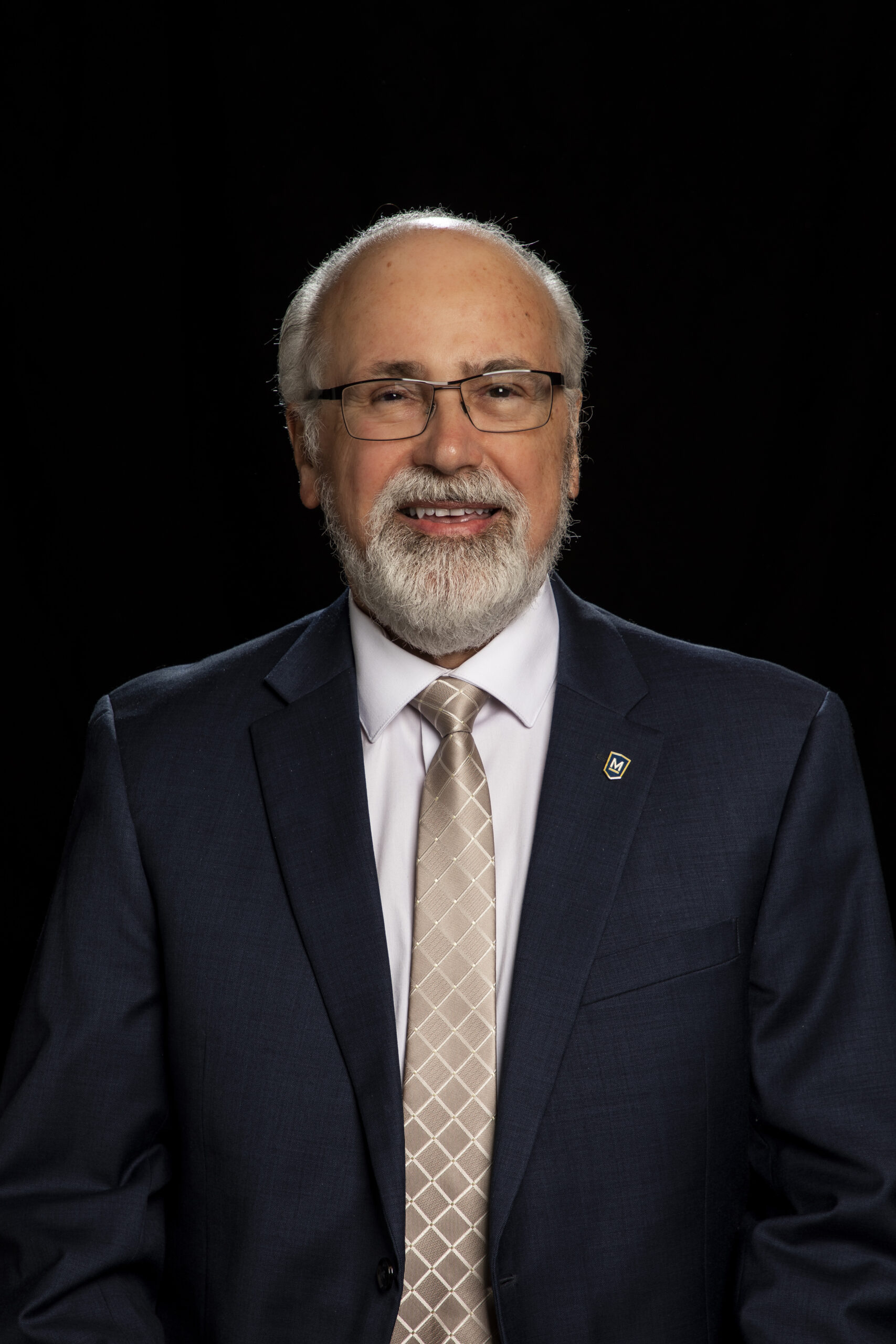
Dr. Marty Marriott
Chancellor

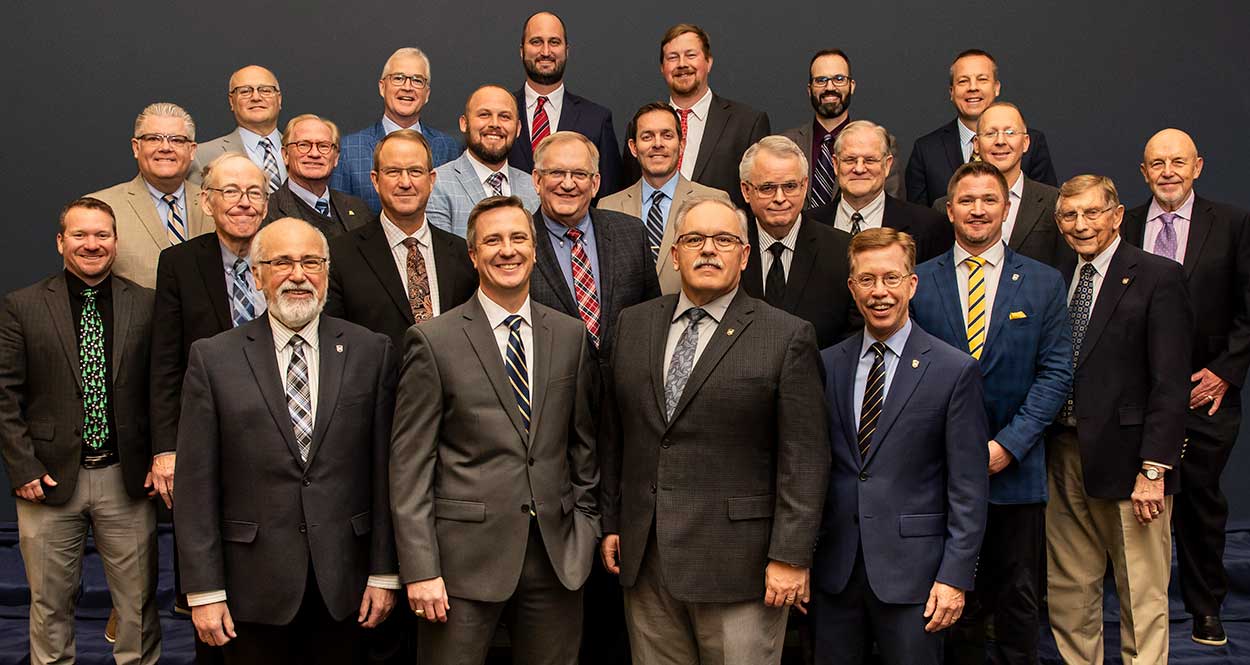
BOARD OF TRUSTEES
- Matthew Davis* | Chief Executive Officer, Watertown, WI
- David Anderson* | President, Watertown, WI
- Marty Marriott* | Chancellor, Watertown, WI
- David Oliver, Chairman* | Pastor, Belding, MI
- Kevin Ames | Retired Businessman, Pacifica, CA
- David Baldwin | Businessman, Owosso, MI
- Darrell Beernink | Retired Businessman, Normal, IL
- Stephen Burton | Businessman, Chesapeake, VA
- Jeremiah Cochran | Pastor, Toney, AL
- Andy Counterman | Mission Director, Burlington, IA
- Michael Dean* | Attorney, Brookfield, WI
- Randell Gillespie | Businessman, Georgetown, TX
- Bob Loggans* | Pastor, Watertown, WI
- Randy Melchert Jr. | Educator & Attorney, Menomonee Falls, WI
- Zachary Mortimer | Businessman, Shelocta, PA
- Mark Poorman* | Pastor, Fridley, MN
- Chad Prigge | Pastor, Watertown, WI
- Dave Schlagel | Pastor, Downers Grove, IL
- Tim Schmig | Educator, Owosso, MI
- Jesse Sherburn | Research Engineer, Vicksburg, MS
- Michael Stoltenberg | Physician, Watertown, WI
*Indicates Executive Committee member
Board of Resource
- Todd Abbey | Pastor, Fairfax Station, VA
- William Cover | Pastor, Houston, TX
- Joel Mikkelson | Pastor, Santa Maria, CA
- Aaron Wilson | Camp Director, Prudenville, MI
Emeriti
- Doug Jackson | Saginaw, MI
- Ron Allen | Canton, GA
- Greg McLaughlin | Huntsville, AL

Executive Council
The Executive Council (EC), the institution’s highest internal policy-making and appellate body, is made up of the executive-level leadership of the institution. The EC meets regularly to address human resource issues and policy implementation. The EC represents an important safeguard on institutional policy while maintaining the connection to the strategic plan. The CEO serves as the Chair of the Executive Council.
- Matthew Davis, JD, BS | Chief Executive Officer, Chair
- David Anderson, DMin, MDiv, BA | President
- Marty Marriott, DD, MDiv, MA, BS, BA | Chancellor
- Donald Donovan, CPA, BS | Chief Financial Officer, Vice President for Business Affairs
- Andrew Goodwill, PhD, MA, BA | Dean of Students and Faculty in College of Bible and Church Ministries and Seminary
- Tom Graham, EdD, MA, BA | Vice President for Academic Affairs
- Tim McPhillips, MA, BS | Vice President for Advancement
strategy council
The Strategy Council (SC) oversees the strategic planning process (implementation, project management, and revision), accreditation efforts (Higher Learning Commission requirements and tasks, program accreditation, compliance efforts), and institutional assessment (institutional outcomes, academic program review, operational department review). The CEO serves as the Chair of the SC.
- Matthew Davis, JD, BS | Chief Executive Officer, Chair
- David Anderson, DMin, MDiv, BA | President
- Marty Marriott, DD, MDiv, MA, BS, BA | Chancellor
- Jonathan Coleman, MEd, MA, BA | Director of Institutional Research and Effectiveness
- Dana Davis, MS, BS | Assistant Vice President, Online and Distance Learning
- Tom Graham, EdD, MA, BA | Vice President for Academic Affairs, Vice Chair
- Tim McPhillips, MA, BS | Vice President for Advancement
- D. Lance Saxon Jr., BA | Registrar
leadership council
The Leadership Council (LC) represents a vital nexus for the cross-flow of communication between departments and academic units. The LC is comprised of the directors of every major department and academic unit as well as the administration of the university. Department leaders communicate recent developments, share innovations, and promote upcoming events. The LC reports provide a free-flow of information on strategic direction and key organizational planning processes.
- Matthew Davis, JD, BS | Chief Executive Officer
- David Anderson, DMin, MDiv, BA | President
- Marty Marriott, DD, MDiv, MA, BS, BA | Chancellor
- Philip Alsup, EdD, MS, BS | Maranatha Baptist Academy Administrator
- Doug Bachorik, PhD, MM, BS | Chair of the Department of Music
- Ken Banks, WIP PhD, MABS, BA | Director of IT, Network Administrator
- Dan Bjokne, MDiv, MEd, BS | Director of Development
- Steve Board, BS | Interim Director of the School of Business
- John Brandt, BS, MBA | Director of Financial Aid
- Paul Brown, BS | Athletics Director
- Ken Butler, MA, BA | Director of Maranatha Baptist Bible Institute
- Melissa Chapman, BA | Director of Kiddie Kampus
- Jared Chesley, BS | Facilities Manager
- Jonathan Coleman, MEd, MA, BA | Director of Institutional Research and Effectiveness
- Dana Davis, MS, BS | Assistant Vice President of Online and Distance Learning
- Luke DeWald, WIP DMIN, MA, BA | Director of Office of Student Activities
- Donald Donovan, CPA, BS | Chief Financial Officer, Vice President for Business Affairs
- Andrew Goodwill, PhD, MA, BA | Dean of Students
- Tom Graham, EdD, MA, BA | Vice President for Academic Affairs
- Lane Hansel, EdD, MS, MS, BS | Chair of the Department of Applied Science
- Emily Haynes, MA, BA | Dean of Women
- Milton Jones, DSMin, MMin, BS | Assistant to the President
- Tim McPhillips, MA, BS | Vice President for Advancement
- Angela Morris, MS, BS | Chair of the Department of Humanities
- Tad Nuce, EdD, MS, BA | Dean of the School of Education
- Kathleen Price, BS | Interim Library Director
- D. Lance Saxon, BA | Registrar
- Rob Thompson, BS | Assistant Vice President for Enrollment Management
- Sarah Urban, PhD, MSN, BSN | Dean of the School of Nursing
- Peter Wright, MA, BS | Director of Student Recruitment, Director of Alumni Services
Commitment
Statements
Maranatha’s doctrinal statement originated in the first year of Maranatha’s existence. In 2009, the Bible faculty and seminary faculty created an expansion of the doctrinal statement and set forth the following declaration of its commitment to biblical truth and its application of that truth to the lives of its students, staff, and faculty.
Statement of Faith
Within our Statement of Faith, we have provided a short summary of our doctrinal positions. For more thorough descriptions, please read our Commitment Statements.
We believe in . . .
- The verbal, plenary inspiration of the Old and New Testaments
- God in three persons—Father, Son, and Holy Spirit
- The new birth in Christ alone
- Baptism by immersion for believers only
- The eternal security of the believer
- The Lord’s Supper as a memorial
- Six creation days of 24 hours each
- The bodily resurrection of Christ and His bodily ascension into heaven, where He now intercedes for believers
- The pretribulation rapture of all believers
- The premillennial return and millennial reign of the Lord Jesus Christ
- The judgment
- The reality of heaven and hell
- The local church as God’s institution to carry out the Great Commission
- The obligation of every believer to live a holy life and witness to the lost of the saving power of Christ
Institutional Distinctives
Baptist
Maranatha stands without apology for the Baptist distinctives. Baptistic principles and polity are taught in the classroom and practiced in the personal ministries of each faculty member.
Biblical
Maranatha believes in verbal, plenary inspiration. The Bible is the sole authority for faith and practice and is inerrant in all matters it addresses. The literal, historical-grammatical approach to the interpretation of God’s Word is emphasized through the entire curriculum.
Dispensational
Maranatha emphasizes the pretribulational rapture of all believers and the premillennial return and reign of Jesus Christ. Students are warned about the errors of Reformed theology, and they are taught to “rightly divide the Word of Truth.”
Evangelistic
Maranatha challenges and prepares students to have warm soul-winners’ hearts and to build strong evangelistic churches. The faculty includes teachers who have many years of experience in building and developing soul-winning churches.
Local Church
Maranatha teaches that the local New Testament church is God’s ordained institution to carry out His work in this age. The primacy of the local church in scriptural teaching is emphasized in both doctrine and practice.
Separatist
Maranatha takes a clear-cut stand on separation from personal worldliness and ecclesiastical error. The leadership of the school has been and continues to be against all forms of modernism, inclusivism, neo-orthodoxy, new evangelicalism, and other forms of theological compromise.
Core Values
Excellence
Integrity
Unity
Fidelity
Charity
Balance
Learning
Leadership
Family
Excellence
Fidelity
Learning
Integrity
Charity
Leadership
Unity
Balance
Family
Excellence
The pursuit of excellence; maintaining a bias toward positive change involving growth and maturity; systematic improvements made by university personnel and individual departments as a natural outgrowth of performance feedback and institutional research (Philippians 3:13,14)
Integrity
Integrity, moral excellence, and a good testimony; students and college personnel living consistently according to biblical principles in the sight of God and men (2 Corinthians 4:2, 8:21)
Unity
Unity within diversity governed by the parameters of biblical truth, welcoming individual talents, gifts, and viewpoints (1 Corinthians 1:10, 12:11-26; Ephesians 4:16)
Fidelity
Fidelity to God and His Word by believing, practicing, propagating, and contending for the faith in accordance with our fundamental Baptist heritage and by adhering to the founding purpose, vision, and mission of the institution (1 Thessalonians 5:21; 2 Timothy 1:13; Hebrews 10:23; Philippians. 2:16; Jude 3)
Charity
Charity and kindness to all (Luke 6:35-36; 1 Corinthians 13:4; Ephesians 4:32); communicating openly, honestly, and with encouragement; when confrontation is necessary, using messages that are guided by principles of care and edification (Ephesians 4:29)
Balance
Educational balance that focuses on the whole person; improving the mental, physical, spiritual, social, and aesthetic dimension of the individual (Luke 2:52, 10:27; Mark 12:30)
Learning
A biblically based process that includes study, discipline, listening, observation, and involvement to equip students to serve with competence in their chosen vocations (2 Timothy 2:15; Ephesians 4:12)
Leadership
Service to God, the local church, and others; students and college personnel ministering and leading as a principle of life (Matthew 4:10; Luke 22:26-29; John 12:26; Galatians 5:13; Hebrews 9:14; 12:28)
Family
Family-friendly attitude; recognizing the importance, role, and sanctity of traditional family life to the well-being of university personnel and students (Ephesians 5:22-23)
Excellence
The pursuit of excellence; maintaining a bias toward positive change involving growth and maturity; systematic improvements made by university personnel and individual departments as a natural outgrowth of performance feedback and institutional research (Philippians 3:13,14)
Integrity
Integrity, moral excellence, and a good testimony; students and college personnel living consistently according to biblical principles in the sight of God and men (2 Corinthians 4:2, 8:21)
Unity
Unity within diversity governed by the parameters of biblical truth, welcoming individual talents, gifts, and viewpoints (1 Corinthians 1:10, 12:11-26; Ephesians 4:16)
Fidelity
Fidelity to God and His Word by believing, practicing, propagating, and contending for the faith in accordance with our fundamental Baptist heritage and by adhering to the founding purpose, vision, and mission of the institution (1 Thessalonians 5:21; 2 Timothy 1:13; Hebrews 10:23; Philippians. 2:16; Jude 3)
Charity
Charity and kindness to all (Luke 6:35-36; 1 Corinthians 13:4; Ephesians 4:32); communicating openly, honestly, and with encouragement; when confrontation is necessary, using messages that are guided by principles of care and edification (Ephesians 4:29)
Balance
Educational balance that focuses on the whole person; improving the mental, physical, spiritual, social, and aesthetic dimension of the individual (Luke 2:52, 10:27; Mark 12:30)
Learning
A biblically based process that includes study, discipline, listening, observation, and involvement to equip students to serve with competence in their chosen vocations (2 Timothy 2:15; Ephesians 4:12)
Leadership
Service to God, the local church, and others; students and college personnel ministering and leading as a principle of life (Matthew 4:10; Luke 22:26-29; John 12:26; Galatians 5:13; Hebrews 9:14; 12:28)
Family
Family-friendly attitude; recognizing the importance, role, and sanctity of traditional family life to the well-being of university personnel and students (Ephesians 5:22-23)

Scientific Reasoning
Students will use scientific principles to draw empirical conclusions about the order of all creation.
Quantitative Reasoning
Students will apply quantitative skills to interpret data and solve problems.
Critical Analysis
Students will evaluate concepts from a biblical worldview with logical reasoning and intellectual honesty.
Biblical Interpretation
Students will interpret Scripture using the historical-grammatical method with careful attention to the immediate and broad biblical context.
Doctrinal Defense
Students will defend the historical biblical faith.
Baptist Distinctives
Students will explain the Baptist distinctives in the context of Baptist history.
Cultural Awareness
Students will respond to the dynamics of culture with discernment while showing respect to all people as image-bearers of God.
Biblical Ethics
Students will make moral judgments based on biblical principles.
Historical Understanding
Students will analyze the influence of philosophical ideas on societal trends throughout history.
Written Communication
Students will write correctly and cohesively with compelling argumentation.
Oral Communication
Students will articulate ideas clearly and dynamically.
Servant Leadership
Students will apply the principles of biblical servant leadership.
Our History
Maranatha is an institution committed to the principles on which it was founded—the truth of God’s Word and an adherence to Baptist distinctives that sets it apart from other Christian colleges and universities. That commitment began in 1968, when Maranatha Baptist Bible College was established by Dr. B. Myron Cedarholm and his wife, Thelma.
